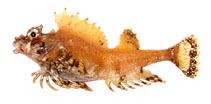| Family: |
Agonidae (Poachers), subfamily: Hypsagoninae |
| Max. size: |
12 cm TL (male/unsexed); max.weight: 24.0 g; max. reported age: 7 years |
| Environment: |
demersal; marine; depth range 0 - 452 m, non-migratory |
| Distribution: |
North Pacific: Sea of Okhotsk, Sea of Japan (Ref. 559), Kuril Islands (Ref. 56580) and the Bering Sea to Puget Sound, Washington, USA. |
| Diagnosis: |
Dorsal spines (total): 8-11; Dorsal soft rays (total): 5-7; Anal spines: 0-0; Anal soft rays: 8-11; Vertebrae: 35-37. Lower lobe of pectoral fin with 7 to 8 free rays. A barbel is present on the tip of the snout. Dorsum highly elevated at nape. Branchial membrane free from isthmus. Supralateral and infralateral plates attached to each other on lateral line. Dorsal fins close to each other. Lateral line plates less than 15. |
| Biology: |
Rocky sand, gravel, or pebble bottoms. Frequently covered by featherlike polyps (small hydroid animals) (Ref. 2850). |
| IUCN Red List Status: |
Not Evaluated (N.E.) Ref. (130435)
|
| Threat to humans: |
harmless |
Source and more info: www.fishbase.org. For personal, classroom, and other internal use only. Not for publication.
